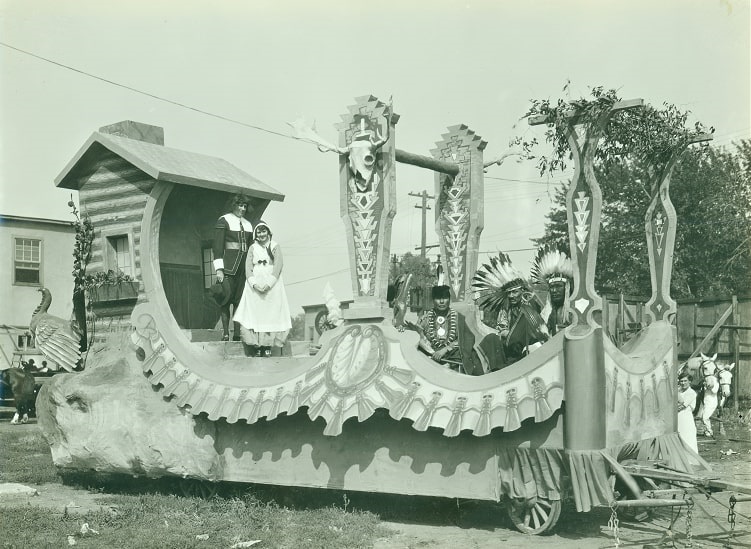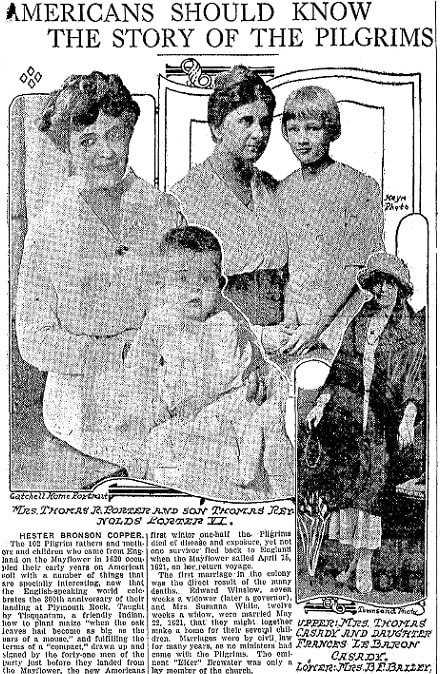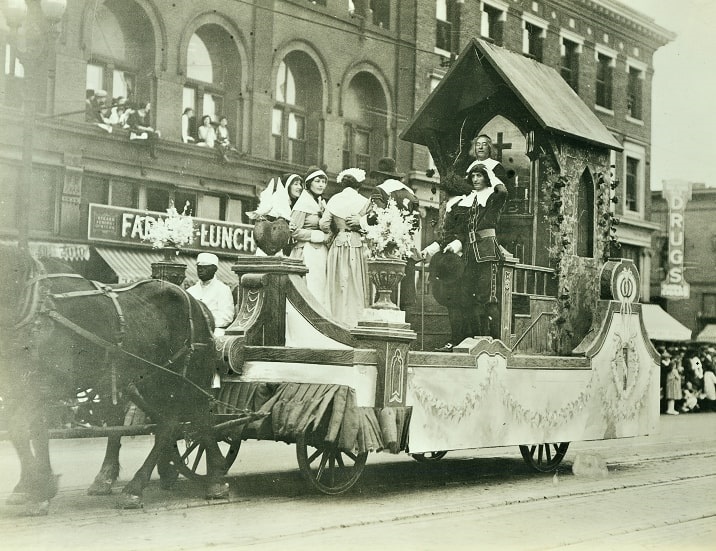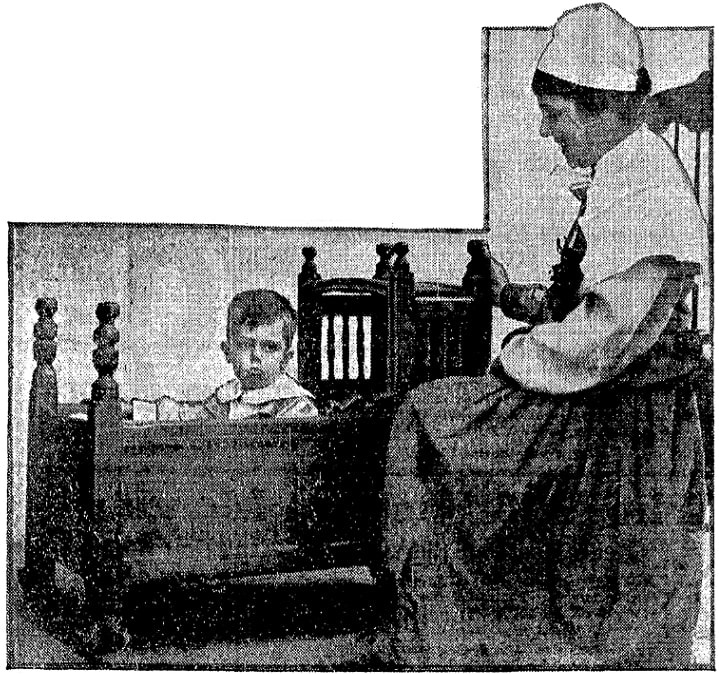Introduction: In this article, Melissa Davenport Berry continues her series profiling descendants of the Mayflower settlers, focusing on tricentennial celebrations in Nebraska in 1920. Melissa is a genealogist who has a blog, AnceStory Archives, and a Facebook group, New England Family Genealogy and History.
In 1920 Mayflower descendants all over the United States were celebrating the 300th anniversary of the landing of their Pilgrim ancestors. In Omaha, Nebraska, a parade, or “Pilgrims Pageant,” was organized by John Lee Webster, the state chairman of the Nebraska Society of Mayflower Descendants.

The event was part of the Ak-Sar-Ben Fall Festival, and Pilgrim float designs were prepared by sign painter Gus Renze and his artists. The Nebraska Historical Society has photos in their archive collection of the floats, and the Omaha World-Herald furnished information on the Mayflower Society members who participated.

According to this article:
“During the first winter one-half of the Pilgrims died of disease and exposure, yet not one survivor fled back to England when the Mayflower sailed April 15, 1621, on her return voyage.
“The first marriage in the colony was the direct result of the many deaths. Edward Winslow, seven weeks a widow (later a governor), and Mrs. Susanna White, twelve weeks a widow, were married May 22, 1621, that they might together make a home for their several children. Marriages were by civil law for many years, as no ministers had come with the Pilgrims. The eminent ‘Elder’ [William] Brewster was only a lay member of the church.”
Their marriage was commemorated by a special float during the 1920 “Pilgrims Pageant” parade:
“A float featuring the wedding of Edward Winslow and Mrs. White will be one of several designs in Omaha’s celebration of the landing of the Pilgrims.”

There were several other floats as well:
“…the signing of the [Mayflower] Compact, the float financed by Omaha lawyers; a float showing Plymouth Rock, financed by Omaha bankers; and a very life-like Mayflower surmounting the bounding billows, furnished by Carl Gray, president of the Union Pacific Railway Co.”
Carl Raymond Gray was the son of Oliver Crosby Gray and Virginia Lafayette Davis, aka “Little Mudder,” and a descendant of Francis Cooke, Stephen Hopkins, William Bradford, Richard Warren, and William Brewster. He was the organizer and 1st Chairman of the Nebraska Mayflower Society group. (See: The Mayflower Passengers’ Dark Side: Scandal in Plymouth Colony, Part I.
The newspaper goes on to list many of the Mayflower descendants living in Nebraska. One of the newest members was ten-month-old Thomas Reynolds Porter VI, son of Thomas R. Porter V and Mabel C. Higgins.
The article reports:
“[Thomas Porter] is of the eleventh generation on his mother’s side from the Mayflower surgeon, Dr. Samuel Fuller. This little fellow is the first of his mother’s direct line of ancestors to have been born away from Plymouth, and he will accompany his parents, Mr. and Mrs. T. R. Porter of Omaha, back to Plymouth this fall to make good a family tradition. Every child born into the Fuller line of descent, or anyone who marries into the family, must be rocked in the old Fuller cradle now in the Pilgrim Museum in Plymouth, Massachusetts.”
Mabel C. Higgins Porter’s family include allied lines Mitchell, Nash, Pratt, Kingsman, Reed, Shaw, Loud, Burrell, Tirrell, Noyes, Poore, and Hale. She also descends from Francis Cooke, John Alden, and Priscilla Mullens.
According to this article:
“As for Dr. Samuel Fuller, he was one of the great characters in Plymouth Colony. Among other bequests he remembered a beloved friend thus: ‘Whatsoever Mr. Roger Williams is indebted upon my books for physic, I freely give him.’ Dr. Fuller owned a library of twenty-seven books. Medical works were very few in those days.”
In another GenalogyBank search, I found a newspaper article showing young Master Porter rocking in the relic Fuller cradle at age three with his mother dressed in Pilgrim attire. According to Mrs. Porter, the Fuller cradle was in her family’s home in Abington, Massachusetts, before it made its way to the museum. You can read more about the cradle here; see: Discovering a Unique Family Relic through Newspapers.

Stay tuned for more on Nebraska’s “Mayflower Descendants: Who’s Who.”
Note: An online collection of newspapers, such as GenealogyBank’s Historical Newspaper Archives, is not only a great way to learn about the lives of your ancestors – the old newspaper articles also help you understand American history and the times your ancestors lived in, and the news they talked about and read in their local papers. Do you have a family connection all the way back to the Mayflower Pilgrims?
Related Articles:
- Mayflower Descendants: Who’s Who, Part I
- Mayflower Descendants: Who’s Who, Part II
- Mayflower Descendants: Who’s Who, Part III
- Mayflower Descendants: Who’s Who, Part IV
- Mayflower Descendants: Who’s Who, Part V
- Mayflower Descendants: Who’s Who, Part VI
- Mayflower Descendants: Who’s Who, Part VII
- Mayflower Descendants: Who’s Who, Part VII (conclusion)
- Mayflower Descendants: Who’s Who, Part 8
- Mayflower Descendants: Who’s Who, Part 9
- Mayflower Descendants: Who’s Who, Part 10
- Mayflower Descendants: Who’s Who, Part 11
- Mayflower Descendants: Who’s Who, Part 12

Edward Winslow was married to my 9th great grandmother Susanna “Anne” Fuller 1594-1680. Love reading all the info. Thanks for all the hard work you have done.
Hello Elisa. Love this series and the Fuller family. I appreciate your comment and stay tuned for more. Thanks!
You have found some interesting information on GenealogyBank. Appreciate all the detail you write about for us readers. Anything about the first Pilgrims is fascinating. Especially Winslow. Thank you for your great articles.